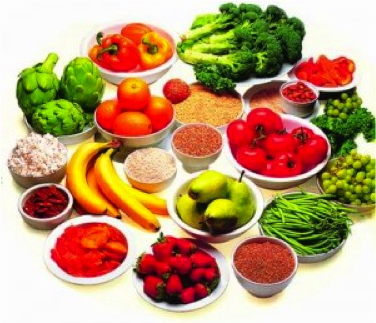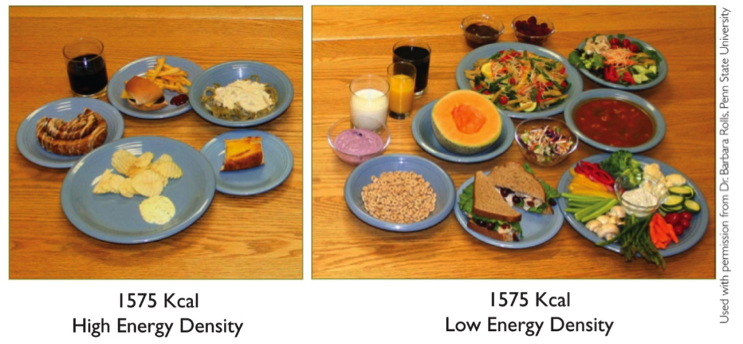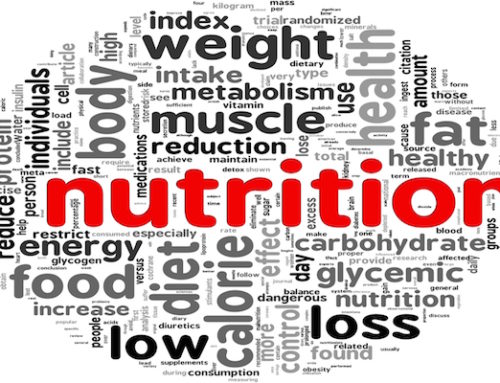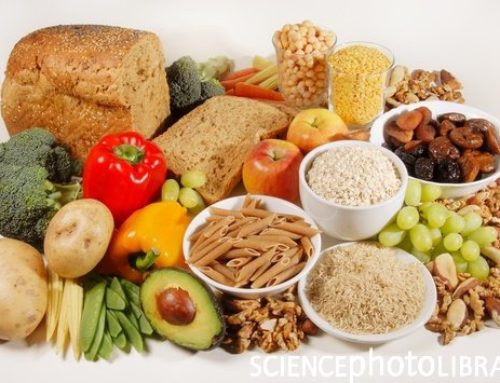What is CRON?
 The goal of any weight/fat loss diet is to reduce calorie intake because when it comes to losing weight/fat reducing overall calorie consumption in relation to energy expenditure is the only scientifically proven way to do it.
The goal of any weight/fat loss diet is to reduce calorie intake because when it comes to losing weight/fat reducing overall calorie consumption in relation to energy expenditure is the only scientifically proven way to do it.
However when we diet we tend to either eat less food overall or restrict or cut out entire food groups, ie, low carb, gluten free, low fat, vegan or vegetarian diets, or where there is a food allergy or intolerance present. The problem with this is that we then often have a reduction in nutrients that come from those foods. This is especially prevalent with fad diets. Even if entire food groups are not cut, the restriction in the quantity of food we are eating can lead to a nutrient deficit because we are creatures of habit and tend to eat the same few meals over and over again, and while there is nothing inherently wrong with this; we do need to be aware of the nutrient profile of the meals we choose and not just focus on the number of calories or the Macro Nutrients like carbs, fat and protein.
Macros as well as Micro nutrients play an important role in maintaining and promoting our health and well-being, so while calorie restriction is king when it comes to fat loss, we need to make sure we are getting as many or more nutrients from the calories we are eating. Studies have shown that restricting calories can have a host of health benefits, including promoting Autophagy, the process by which cells repair themselves, but can also increase longevity (Jama). Many of the original studies on CR in rodents and other short-lived species showed consistently that CR produced significant increases in longevity and decreased age-associated markers. While more studies are needed to determine the long term effects of CR in humans several studies have shown key biomarkers of longevity are positively affected to suggest longevity benefits and improve signs of ageing (Heilbronn et al 2006, Weiss & Fontana 2011).
Why We Want More Nutrients
Nutrients are the components that make up the foods that our bodies convert to energy and use for growth and repair. They are essential for survival, growth and health and must be obtained from our diets. There are two main types: Macro nutrients and Micro nutrients. Macro nutrients are Proteins, Carbohydrates and Fats and provide the bulk of what our bodies use to convert to energy, while micronutrients provide the necessary co-factors for metabolism and energy production. Unless we are severely restricting the types of foods we eat meeting our Macro nutrient needs is rarely a problem, however meeting our Micro nutrient needs is an entirely different story, especially when we start restricting calories and trying to lose fat. It is possible to meet all your macros while not getting enough micros, especially if we eat a diet high in processed foods. Most processed foods are severely lacking in any micro nutrients.
There are many common health problems and diseases that are caused by micro nutrient deficiency, of which the table below shows just a few examples, this is by no means exhaustive as there are over 80 micronutrients we need on a daily basis and many cannot be manufactured by the body, therefore must be taken in through the diet, and each of these have numerous associated deficiency diseases.
| Nutrient | Symptoms | Food source |
| Vit A | Night blindness, dry eyes, poor bone growth, impaired resistance to infection, papillary hyperkeratosis of the skin | Breast milk, infant formula, liver, egg yolk, dark green and deep yellow vegetables and Fruits |
| Vit D | Rickets (symptoms: costochondral beading, epiphyseal enlargement, cranial bossing, bowed legs, persistently openanterior fontanelle) | Breast milk, infant formula, liver, egg yolk, dark green and deep yellow vegetables and fruits |
| Vit E | Hemolytic anemia in the premature and newborn; hyporeflexia, and spinocerebellar and retinal degeneration | Breast milk; infant formula; vegetable oils; liver; egg yolk; butter; green leafy vegetables;whole-grain breads, cereals, and other fortified or enriched grain products; wheat germ |
| Vit K | Prolonged bleeding and prothrombintime; hemorrhagic manifestations
(especially in newborns) |
Infant formula, vegetable oils, green leafy vegetables, pork, liver |
| Iron | Hypochromic microcytic anemia;malabsorption; irritability; anorexia; pallor, lethargy Hemochromatosis; hemosiderosis. | Breast milk; infant formula; meat; liver; legumes; wholegrain breads, cereals, or fortified or enriched grain products; and dark green vegetables |
| Zinc | Decreased wound healing, hypogonadism, mild anemia, decreased taste acuity, hair loss, diarrhea, growth failure, skin changes | Breast milk; infant formula; meat; liver; egg yolk; oysters and other seafood; whole-grainbreads, cereals, and other fortified or enriched grain products; legumes |
| Calcium | Rickets – abnormal development of bones, memory loss, Osteoporosis, muscle spasms, numbness and tingling in hands and feet, depression, hallucinations, hypertension and cardiac arrhythmias | Breast milk, infant formula, yogurt, cheese, fortified orenriched grain products, some green leafy vegetables (such as collards, kale mustard greens, and turnip greens), tofu (if made with calcium sulfate),
sardines, salmon
|
| Riboflavin(Vitamin B2) | Photophobia, cheilosis, glossitis, corneal vascularization, poor growth | Breast milk; infant formula, meat; dairy products; egg yolk; legumes; green vegetables; whole-grain breads, cereals, and fortified or enriched grain products |
| Magnesium | Muscle tremors; convulsions; irritability; tetany; hyper-or hypoflexia | Breast milk; infant formula; whole-grain breads, cereals, and other grain products; tofu; legumes; green vegetables |
| Potassium | Muscle weakness; decreased intestinal tone and distension; cardiac arrhythmias; respiratory failure | Breast milk; infant formula; fruits especially orange juice, bananas, and dried fruits; yogurt; potatoes; meat; fish; poultry; soy products; vegetables |
| Iodine | Endemic goiter; depressed thyroidfunction; cretinism | Breast milk, infant formula, seafood, iodized salt |
Calorie Restriction: Why Do We Want To Restrict Calories?
We want to restrict calories for a number of reasons:
- Calories are what really counts when it comes to weight/fat loss or gain. Overall calories will count for those trying to increase muscle mass as well as for those trying to lose fat. Beyond that the type of calories matter as well. Obesity is a worldwide epidemic; according to the Australian Institute of Health and Welfare, almost 2 in 3 (63%) of Australian adults are overweight or obese, 1 in 4 (25%) of Australian children are overweight or obese and overweight and obesity (high BMI) is the 2nd highest contributor to the burden of disease, after dietary risks. Smoking is the third highest.
- Less Calories = better health. Prolonged calorie restriction has been shown to affect the bio markers for longevity and oxidative stress. What this means is not only reduced body weight and body fat but a reduction in fasting insulin levels, lower body temperature and a slower metabolism (which is not always a bad thing – more on that later) these consequences of calorie restriction can help lower the risk of many degenerative diseases such as diabetes. There is no argument that being overweight can lead to a shorter less healthy life, promote degenerative diseases like diabetes, high blood pressure and Alzheimer’s, and the relationship between being overweight and chronic inflammation is well established (fight ageing.org). It has been shown that calorie restriction can help fight these diseases and the ageing process by promoting greater Autophagy, which is the process by which cells repair and recycle themselves rather than letting the cell die and creating new cells to replace them. The more an individual cell can repair and recycle the less it is affected by the ageing process. (Jama)
- Aging – The aging process is caused by cells being damaged by oxidative stress and being unable to repair themselves. A fast metabolism, whilst desirable for fat loss; increases this process. A calorie restriction may slow the metabolism, but this may not be as detrimental to body composition as many people believe. Usually speeding up the metabolism in order to change body composition is the goal of many exercise and diet plans, however now that we know this can increase the ageing process, is there a way we can decrease the metabolic rate while still reducing fat mass, maintaining lean muscle mass and thereby promoting better health, slower ageing, less risk of degenerative disease and potentially increasing life span? Long term, sensible calorie restriction while maintaining optimum nutrient intake may be the answer. And furthermore, a faster metabolism (for the sake of increased calorie burn) is only really necessary when caloric expenditure from physical activity is insufficient. So if you exercise enough why would you need a faster metabolism to burn more calories when you have controlled calorie intake and ample physical activity?
Calorie Dense Foods Vs Nutrient Dense Foods
Definition: Calorie dense (or energy dense) foods are those foods that provide a large amount of calories for a small portion size and more often than not these foods are very low in nutrients. Some examples include pastries, lollies, burgers, chips (hot and crisps) many takeaways and most fast foods. These foods are often deficient in nutrients and while they may provide some energy, usually in the form of fat and processed carbohydrates, they are usually devoid of any micronutrients and in some cases are full of artificial colours and flavours which are chemically manufactured.
Nutrient dense foods provide a large amount of nutrients relative to their serving size and more often than not these foods are low in calories. Some examples include fresh fruit, veges, and lean meats. These foods provide significant quantities of Protein, carbs or fats and more often than not are the only source of many micronutrients such as vitamins, minerals and trace elements. So the idea is to get more nutrients and quite often a higher volume of food for the same or smaller amounts of calories. The higher volume of food will keep you fuller for longer and provide you with the vital nutrients to optimise health and wellbeing.
Knowing this, it makes sense then to base our diet on nutrient dense rather than calorie dense foods. Some simple daily habit changes can make this process easy, painless, habit forming and beneficial to our health for obvious reasons. Eating nutrient dense foods will help you to stabilise or lose weight effortlessly and these foods have many health benefits because they provide the micronutrients our body needs in the most natural and usable form. If we change the focus of our nutrition from counting calories, carbs, protein and fat to finding the best sources of nutrients for our body then it becomes easier to eat a healthful, calorie-reduced diet because there is literally no room for junk food and empty calories. For example the picture below shows foods with exactly the same amount of calories (remember calories are king when it comes to weight loss or weight gain) but it’s obvious one type of food has more volume and will keep you fuller for longer and promote health, while the other is not such a great choice.

Which do you think would be more satisfying to eat over the course of a day? Most of us could consume the picture on the left over about an hour and then be looking for more food about an hour after that. As for the picture on the right, most of us would be fully satisfied with that amount of food over the day, we would have more energy, think more clearly and would be well on the way to improving our health and well-being if we chose to eat like this every day.
So How Much Should We Restrict Our Calories?
We should aim to restrict our calories by 20-40% below what is considered typical (fightaging.org). We still need to pay attention to optimising nutrient intake however. Depending on your goals, lifestyle and the current condition of your health mild CRON may involve nothing more than adopting a healthier diet by increasing fruit, vegetables and lean meat intake and “crowding out” processed foods and empty calories, not eating snacks and adding supplements where current dietary intake may be inadequate.
Before going full on into CRON, practice eating a healthier diet by the above methods, assess how you feel and if any of the desired results are being achieved, if not, assess your calorie intake and look at where you can reduce them further without jeopardising your nutrients.
There is a lot of support and reading that can be done on this subject, some of the books I would recommend are:
- Forever Fat Loss, by Ari Whitten
- The Longevity Diet: Discover Calorie Restriction, by Brian M Delany, Lisa Walford and Roy L Walford MD
Download Article: Calorie Restriction with Optimum Nutrition
If you have any questions regarding optimising your health and physique the smart way feel free to contact us via our details on the website. I’d be happy to help.
Yours in health and fitness.
Isla Staff




